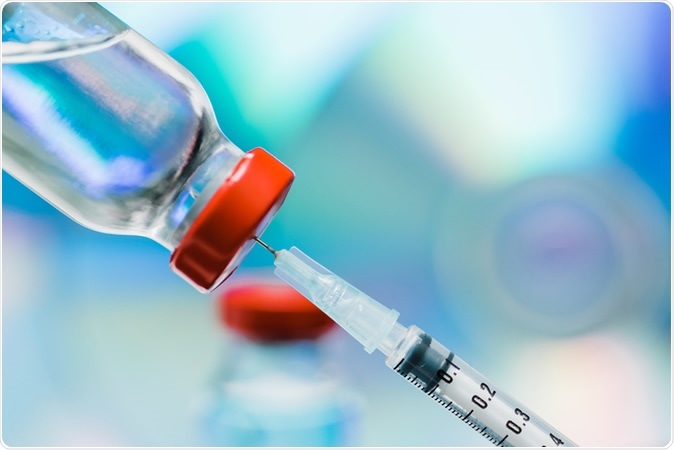The coronavirus disease (COVID-19) outbreak has swept the world, killing 2,770 people and infecting more than 81,000. Amid the health crisis, scientists from across the globe are racing to develop novel therapies and vaccines in the hope of stemming the spread of the deadly virus.
Now, the first step in a clinical trial for a drug to treat coronavirus has commenced, thanks to a team of scientists from the University of Nebraska Medical Center in Omaha.
Dr. Andre Kalil, an infectious disease specialist and professor of internal medicine, will oversee the drug trial on its first patient, who was repatriated after being quarantined on the Diamond Princess cruise ship in Japan. The study is currently enrolling hospitalized adults with COVID-19 in Nebraska.

NIH begins clinical trial of drug to treat COVID-19. Image Credit: Rohane Hamilton / Shutterstock
The drug
"There is only one drug right now that we think may have real efficacy and that is remdesivir," Bruce Aylward, assistant director-general of the World Health Organization (WHO), said at a press conference.
Developed by Gilead Sciences as a treatment for Marburg virus infection and the Ebola virus disease, remdesivir, is a novel investigational nucleotide analog with broad-spectrum antiviral activity. Though it is not approved globally for any use, it has demonstrated in vitro and in vivo activity in animal models against the viral pathogens SARS and MERS, which are coronaviruses akin to COVID-19.
The drug is an experimental medicine that has only been utilized in a small number of patients with COVID-19 so far; hence, the company does not have a strong understanding of the drug's efficacy and potential for broader use.
Gilead said it is working with global health officials to perform appropriate experimental use of the drug. The drug company is now working closely with the U.S. Centers for Disease Control and Prevention (CDC), the U.S. Food and Drug Administration (FDA), the Department of Health and Human Services (DHHS), the Department of Defense, the National Institute of Allergies and Infectious Diseases (NIAID), the World Health Organization (WHO), and the China CDC and National Medical Product Administration. They are also working with individual clinicians and researchers to track fast the experimental use of the drug in the hopes that it can curb the infection.
NIH clinical trial
The clinical trial, which will be spearheaded by the UNMC and the NIAID, will be conducted at up to 50 sites across the world and will test the drug against a placebo.
Bruce Alyward added that after a recent visit in China, remdesivir is the only drug that appears to have a promise in treating COVID-19, which is spreading rapidly across many countries, including the most affected nations next to China – South Korea, Italy, and Iran, with 1,261, 401, and 139 cases, respectively.
Iran has reported the highest death toll outside China with 19 deaths, followed by 12 deaths in South Korea and ten deaths in Italy.
Currently, the drug is also being tested in two trials in Wuhan, in Hubei province, China, the outbreak's epicenter. Alyward, however, added that there is a slow enrollment in the trial due to a decline in patient numbers. Further, other drugs are also being evaluated.
The patients they are enrolling in the trial have to be a little sicker than just a mild disease tied to COVID-19. They must have a positive coronavirus test, and the virus has already affected the respiratory tract.
At present, there are no specific treatments or drugs approved by the FDA to treat people with COVID-19, the disease caused by the novel pathogen, SARS-CoV-2 virus. The infection can cause mild to severe respiratory illness, including the symptoms of fever, dry cough, and difficulty of breathing.
Another potential vaccine for COVID-19
A new vaccine against the coronavirus disease (COVID-19) will begin trials in six weeks. Developed by drug maker Moderna Inc., the first batch of the vaccine has been shipped to U.S. government researchers, who will oversee the first human clinical trial.
The trial for the novel experimental vaccine will start in April, though the tests and approval for the vaccine to be used in large scales may take as long as one year. The vaccine, called mRNA-1273, is a candidate vaccine against the deadly virus and works by being immunogenic, triggering a response in the immune system that can help fight the infection.
If the trial goes as planned, it may take about three months from the lab to human testing. Though it may take months before the vaccine will be available for use, this would be faster compared to the SARS 2002 outbreak, wherein it took 20 months for NIAID to have a vaccine tested in humans.
Meanwhile, the U.S. government has asked Congress for coronavirus funding of $1.25 billion to track fast the development of drugs and vaccines against the virus. Also, the funds will be used for precautions, surveillance, and treatment of patients infected with the deadly pathogen.